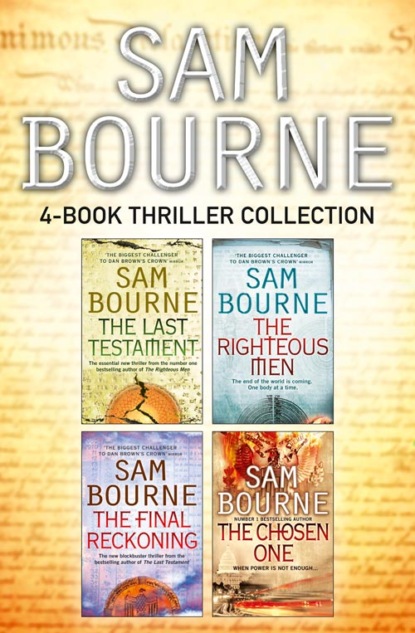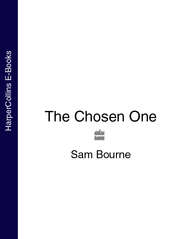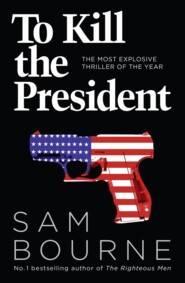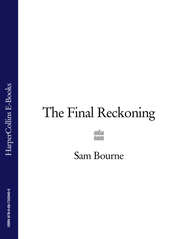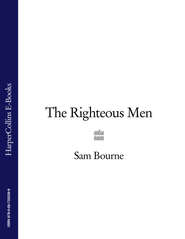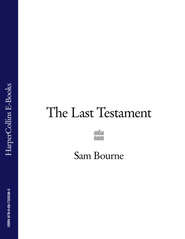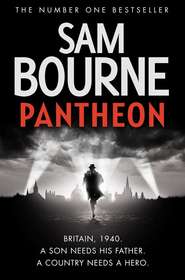По всем вопросам обращайтесь на: info@litportal.ru
(©) 2003-2024.
✖
Sam Bourne 4-Book Thriller Collection
Автор
Год написания книги
2018
Настройки чтения
Размер шрифта
Высота строк
Поля
Monday, 12.51am, Manhattan
In a way, it helped that he was so exhausted. In normal circumstances, his heart would have been banging loud enough to wake the neighbourhood. Instead, his fatigue acted as a kind of defensive shield, slowing down his reactions and even his emotions. His default mental state had become weary resignation.
He was now in handcuffs in the back of a squad car, jammed up against an officer of the New York Police Department. In front, the radio traffic was constant – and all about him. He was, it was clear, a murder suspect.
The men in the car were giving off an odour that Will recalled from his adolescence: testosterone and adrenalin, the smell of a locker room after a big win. These men were high on success, and he was the prize. They had caught him all but red-handed, looming over his victim, his fingerprints on his neck. The officers in this unit could almost touch the police medals they were bound to receive.
‘I did not kill that man,’ Will heard himself say. The scene was so absurd, so remote from the rest of his life experience, that the voice sounded disembodied, unconnected. It was like listening to the radio, one of the BBC afternoon dramas his mother was hooked on.
‘I know what it looks like, but I assure you that’s not what happened.’ Suddenly a bolt of inspiration. ‘But I could lead you to the man who did do it! I followed him out of that building less than an hour ago. I know where he’s hiding! I can even give you a description.’
The officer in the front passenger seat turned around to give Will an ironic smile. Sure you can, son. And I’m gonna pitch for the Yankees next Tuesday.
At the seventh precinct station, Will maintained his defiance. ‘I just found that body!’ he said, as they led him upstairs. ‘I’d seen the man leave the building, I followed him and then I went back. I thought he had killed someone and I was right!’
Even as the words came out of his mouth, he knew they sounded ridiculous. The cop who had been guarding Will from the start stared at him contemptuously. ‘Will you shut the fuck up?’
For the first time since the police had picked him up, Will began to panic. What the hell was he doing here? He needed to get to Beth. He needed to be out on the streets, in Crown Heights or wherever else, searching for his wife – not chained up as a prisoner of the New York Police Department. He was not even thinking about the prospect of being charged with murder; merely losing vital hours battling the bureaucracy of the New York criminal justice system was nightmarish enough. Every minute spent here was another minute not finding Beth. Besides, the Hassidim had been emphatic: there was no time to lose; the fate of the world was to be decided in the coming hours and minutes. Yet here he was, doing nothing; his hands literally tied.
They took him to the sergeant’s desk, where someone was waiting for him: the detective he had seen at the apartment building. He had inspected the scene while they kept Will in the car. ‘I got a prisoner to log in,’ he said, addressing the clerk and ignoring Will. Whippet-faced and in his late thirties, the rising star of the homicide department, Will guessed.
‘OK, let’s empty his pockets.’ The cop who had played bodyguard stepped forward. He had already frisked Will hard at the apartment: after the police had seen the syringe, they were taking no chances. They also took his cell phone and BlackBerry: no calling of accomplices. Now they took the rest: coins, keys, notebook.
‘Let’s get all this stuff vouchered,’ the detective said. Each item was put in a clear, plastic zip-loc bag and sealed. The detective made a note, witnessed by the desk sergeant.
As they opened his wallet, Will was prompted to make one of his biggest mistakes of the night. In among the plastic was his press card: Will Monroe, New York Times.
‘OK, I’ll admit it. The real reason I was in that building was that I was on assignment for the Times. It was undercover. I’ve been writing a series on crime in the city and that’s what I was doing.’
The detective looked at him for the first time.
‘You work for the New York Times?’
‘Yes. Yes, I do,’ said Will, glad just to have got a response. The detective looked away and the clerk went back to her work.
Will was led to another desk, where he was asked to place his right index finger on the electronic device in front of him, hold still, and then do the same with his left. Then the rest of his fingers and his thumbs. It beeped, as if he was a package at a supermarket.
Next, Will was taken towards a room marked ‘interview suite’. On the way the detective handed a copy of Will’s details to a colleague: ‘Jeannie, can you do a name-search on this for me?’
Now they were inside. Just a table, with a chair on either side and a phone in the corner. Nothing on the walls but a calendar: New York, the Empire State.
‘OK, my name is Larry Fitzwalter and I’m going to be your detective for the evening. We’re going to begin like this.’ He produced another form. ‘You have the right to remain silent. Do you understand?’
‘I do understand, but I would really like to explain—’
‘OK, you understand. Can you initial here, please?’
‘Look, I was in there because I followed a man in there—’
‘Can you initial here, please? That means you understand that you have the right to remain silent. OK. Anything you say can and will be used against you in a court of law. Do you understand?’
‘This is a simple mistake—’
‘Do you understand? That’s all I’m asking right now. Do you understand the words I am saying? If you do, then initial the goddamn form.’
Will said no more as Fitzwalter got to the end of the form, telling him his rights. Once it was initialled, the detective pushed it to one side.
‘OK, now that you know your rights, do you wish to talk to us?’
‘Don’t I get to make a phone call?’
‘It’s the middle of the night. Who you gonna call?’
‘Do I have to tell you?’
‘No,’ said the detective, taking the phone from the back table and stretching its cord to place it on the desk between them. ‘Just tell me the number you want me to dial.’
Will knew there was only one person he could possibly call but the idea was appalling. How could he, with this news? He looked at his watch. 2.15am. Fitzwalter was getting impatient.
Will dictated the number. The detective dialled it, then handed him the phone – staying firmly in his seat. It was clear he was going to listen in on every word. Finally, Will heard the voice he was wanting and dreading to hear.
‘Hello? Dad?’
FIFTY-FOUR (#ulink_660983f8-bf83-5667-9c77-3f70e7101887)
Monday, 3.06am, Manhattan
‘I have good news and bad news for you, Mr Monroe.’ It was Fitzwalter. ‘Which would you like first?’
Will lifted his eyes slowly. He had spent only forty minutes in this cell, but it felt like forty nights. His father had told him to invoke the first of the rights he had been read and to say nothing. Once Fitzwalter was certain Will was not going to crack, and that the interview was over, he had him locked up.
‘The good news is that His Honour Judge William Monroe Senior has telephoned to say he is on his way in from Sag Harbor.’
His father’s voice floated back into Will’s head now, as audible as it had been when he made that call. Sleepy, then shocked, then stern, then disappointed, then purposeful. Since Will had spent his youth three thousand miles away from his father, he had never gone through that teenage rite of passage: announcing to your father that you have in some way betrayed his trust. Dad, I trashed the car. Dad, I got caught smoking dope. These were sentences he had never had to utter. He had never heard his father say, as all his contemporaries had, ‘Son, you’ve let me down.’ So to hear it now – not the words, but that tone – was an extra ordeal, to be piled on top of all the others.
‘Mr Monroe, are you listening to me?’
‘Sorry?’
‘You’ve had the good news. Don’t you want to hear the bad news?’
‘Not really, no.’
‘The bad news is, I’ve just come off the phone with the duty lawyer at the Times. He’s made some calls and guess what? They don’t think you’re on assignment for them at all. In fact, what they say is that you’re taking a few days “rest”. By order of the editor himself. Sounds like you got yourself in a whole pile of trouble, my friend.’
Will cupped his hands over his eyes. What a basic error: to offer a lie that could so easily be disproved. His legal defence was already compromised. He had made that cardinal mistake of all guilty men: he had changed his story. As for his career, that was surely over. He would be suspended ‘in order to defend himself on these grave charges’ – and then quietly dropped.
The door slammed shut. In some strange way, Will almost felt grateful to be in this cell. Ever since Friday morning, he had been on the move, feverishly rushing from one place to another, from one new plan to the next. He had criss-crossed the city, in and out, either to Brooklyn or Long Island or back again, trying to think, to focus, to act. Even when sitting down, he had been willing the train or cab to go faster, to get there now, or praying for the phone to ring or an email to arrive.





